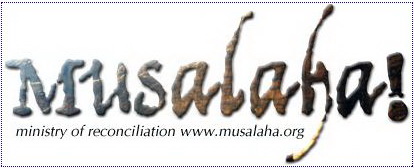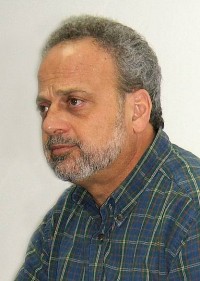
Musalaha (însemnând “reconciliere” în limba arabă) este o organizaţie din Israel, care adună laolaltă creştini evrei şi arabi, şi al cărei scop este promovarea reconcilierii între iudei, musulmani şi creştini. Activităţile organizaţiei sunt dintre cele mai diverse: conferinţe, seminarii, concerte, publicaţii, şi, mai ales, tabere inter-religioase, în care tineri din cele trei religii învaţă să convieţuiască împreună, în confruntarea cu condiţiile vitrege ale deşertului.

Salim Munayer
Redau mai jos comunicatul acestei organizaţii cu privire la situaţia din Gaza. El este semnat de Salim Munayer, liderul acestei organizaţii, cu care m-am întâlnit de câteva ori la Ierusalim. (Atenţie, site-ul Musalaha este încă în construcţie.)
* * *
To both Israelis and Palestinians, the current conflict in Gaza has brought nothing but pain and suffering. It has also caused friction among some believers as they choose to pledge sole allegiance to their own people group. Some are even expressing an unabashed hatred for the other side through articles, e-mails and graphic content on Facebook.
From the Israeli point of view they pulled out of the Gaza Strip in the name of peace and an Islamic regime took over. Israel’s justification for going to war was to protect its citizens against Hamas launching rockets on the communities in the Negev. Soldiers continue to mobilize along the Gaza border as they prepare to defend their people and country against terror. They claim that others would have acted more quickly and aggressively. Their reasoning is that it is necessary to attack now before Hamas has longer-range missiles.
The Palestinians claim that though Israel left the Gaza Strip in 2006, the army is still controlling the borders making it the biggest open-air prison in the world. In the last 18-months, 1.5 million Palestinians have been under siege and were prevented from receiving sufficient water, medical aid and food supply. For the Palestinians, Israel’s withdrawal from Gaza was just an excuse to expand their control in the West Bank and build further settlements. The Palestinians also believe they have a right to self-defense. For them, the Israeli reaction is disproportionate. The number of Israelis killed cannot be compared to the hundreds of Palestinians killed.
Each player in the conflict places the full responsibility of the cycle of violence on the other side. There is a general unwillingness to enter into peace talks on ideological or political grounds. For example, Israel will say Hamas is an ideological religious organization that doesn’t recognize Israel as a Jewish state. Palestinians, on the other hand, say the Palestinian Authority has entered into concessions and nothing substantial has evolved; all that increased were settlements and checkpoints.
So, what is our role as believers in this situation? How can we be a model of Messiah as we move forward in the reconciliation process? Are we too busy challenging the moral and ethical position of the other side that we are unwilling to take responsibility? Because our societies have chosen war and violence, there is a great need for reconciliation. We can accomplish this through taking on a priestly role of intercessor and prophetic role of speaking the truth.
While the conflict has divided some believers, there are those taking a stand and fulfilling their priestly role. I was greatly encouraged last week to hear a Messianic pastor lead his congregation in a prayer of repentance, especially emphasizing that in a time of war, repentance is necessary from both the Israelis and the Palestinians. We must begin by examining our own sins, failures and shortcomings and seek God’s forgiveness and direction.
Applying Joel 2, he read, “Return to me with all your heart, with fasting and weeping and mourning. Rend your heart and not your garments. Return to the Lord your God for he is gracious and compassionate, slow to anger and abounding in love, and he relents from sending calamity” (Joel 2:12-13). God desires us to grieve from within and turn our hearts back towards him. As we as believers intercede on behalf of the people in our societies we need to invoke the nature of God and beg for his mercy and compassion to fall upon us because we have sinned before him. We must also cry out for God’s mercy and compassion to fall upon the other side.
In time of war we are also called to take on a prophetic role. The prophet was a representative of God who brought a message primarily to effect social change. The prophet spoke the truth and reminded us to care for the widow, orphan and stranger. When speaking the prophetic word, we need to be blunt without any hidden messages, and we need to have the courage to speak out when our people are wrong. In the prophetic role we are reminded that we must not only speak out against the injustice which has been committed against our own people, but also against others. We have a duty to speak out against the misuse of power and the blood of the innocent shed whether it is Israeli or Palestinian.
The world views war as war. Some will say, “in war the innocent also die and we cannot help it.” My son was greatly distressed when his friend told him exactly this. I shared with him that in war we need to speak up for the innocent. We cannot justify the act of killing innocent people and say it was in self-defense. Yet, we cannot justify killing someone with a weapon just because they’re holding a weapon. Even killing in war for self-defense should be taken with caution and reverence. The enemy carrying the weapon is also a person who has also been created in the image of God. Especially in a time of war we need to speak louder and clearer against the misuse of power by our governments and their justification of power and violence. War doesn’t mean giving a free hand without any moral and ethical boundaries and limitations.
So, while we are in the midst of war, we need to honestly seek the will of God and be discerning. We must become intercessors for our nation, our leaders and the other side and ask God to pour out his mercy and compassion. We must also become the prophet and convey that message of injustice happening in our societies. We need to attempt to relieve the pain of the innocent even if we feel our side’s reasoning for war is justified. Instead of pointing the finger, let us look within ourselves and repent. Then let us look at the other side with compassion and love, with a love that transcends societal boundaries, rocket fire and airstrikes.
Salim J. Munayer, Ph.D.
Director of Musalaha
Nu, nu reprezint partea americana. Lucrurile astea sunt spuse de diferiti comentori de pe glob. Recent, Hamas si-a asasinat fostii parteneri de guvernare (Fatah) sau i-au impuscat in picicioare de teama sa nu-i tradeze. astea-s fapte..dar…
Oricum, mai jos e un o scurta realatare din surse crestine apropiate de zona de conlict:
“Palestinian Christians afraid to leave Gaza
Israel (MNN) — Israel says it won’t agree to an international ceasefire proposal unless a guarantee is made that the smuggling tunnels are found, destroyed and not rebuilt. In the meantime, organizations helping Palestinian Christians are asking the world to pray that the violence will end. President of Open Doors USA Carl Moeller says Palestinian Christians have nowhere to turn. “They’re not part of Hamas. They’re not radical Islamic terrorists. And, they’re not Israelis. So, the Israelis see them as Palestinians, and the Palestinian terrorists see them as Christians who are not part of their Islamic movement. It’s a tough place to be.” Moeller says seeds of the Gospel have been planted. “Brother Andrew, our founder, has shared Christ with all of the leadership of Hamas. We’re praying these seeds that Andrew and others have sown would take root. Ultimately, the only hope for peace in Gaza is the Prince of Peace, Jesus Christ.”
Intr-adevar Asta e singura sperantsa.
LikeLike
Mie mi se pare ca acest text prezinta o opinie partiala, cea a crestinilor palestinieni, asa cum si comentariul dvs. prezinta o perspectiva partiala, cea americana.
LikeLike
Apelul este corect: sa incetam a arata cu degetul si sa ne pocaim de pacatele proprii; fiecare parte are vina ei.. e-o concluzie corecta a autorului.
Oarecum insa autorul nediferentiaza gravitatea si asta impiedica o solutie… Hamas a profitat de coruptia si nepopularitatea Fatah si a folosit scenariul ce-a dat rezultat in alte parti. Ales cu majoriatate de voturi, ei nu sunt un partid ci o armata bine pregatita extrem de violenta care si-au alungat/omorit concurentii politici (care erau si ei dusmani ai Israelului) pt interesele lor si a sponsorilor lor (Iran). Au introdus un draconic sistem islamic.. iar armele si cruzimea sunt nu doar impotriva Israeluli (ceeea ce ar fi de inteles) ci si a palestinienilor care nu sunt de-acord cu versiunea lor de societate islamica.. In acest context (ca si Hezbulath) declanseaza razboi cind vor. Guvernele nefiind functionale, ca si statul palestinian in sine, cu cine sa se lupte dusmanul (in cazul acesta Israelul)? Cu nimeni, pt ca ei sunt difuzati printre civili a caror sacrificare e justificata de lupta “sfinta”. Copiii morti din vina lor sunt rasplatiti de Alah… Cu aceasta crima sunt de-acord toti musulmanii. N-am auzit pe nimeni sa-i faca criminali din interiorul Islamului (exceptind org. pt drepturile omului). .. Ideologia aceasta criminala pe care n-o combate nimeni la conferintele de pace tsine omenirea captiva. Sustinatorii nazismului sunt condamnati la inchisoare pe buna dreptate. Fascismului islamic i se face loc de frica peste tot in lume. Israelul este dur… dar el actioneaza cu o armata supusa regulilor jocului…. Refuzul lor de-a elibera teritoriile ocupate este o problema; dar si aici s-au aratat dispusi in 1999 (prim ministru Barack). Pe cind sa semneze acordul, paelstinianul Arafat s-a razgindit. Ei nu vor pace! Iar pe palestinieni nu-i vrea nimeni; altfel ar fi putut infiintsa un stat palestinian inainte de 1967. Nimeni n-a fost pasionat de-asa ceva…Bune sau rele, acordurile Camp David si Oslo trebuie sa “moara”. Pacea trebuie incheiata cu alti “garanti” si pt asta a trebuit declansat acest razboi. Care e de fapt intre Israel is Iran si vizeaza aducerea americanilor la masa discutiilor cu Iran si “aripile sale”, Hamas-Hezbulath… Bush a refuzat; politicos, Obama promite sa vina… In cazul acesta pocaintsa trebuie sa includa pe toti actorii. …Iar victimele ramin in seama… dumnezeului in care crede fiecare…Din cauza asta, articolul e prea limitat. Numai Printul Pacii aduce pace acolo!
LikeLike